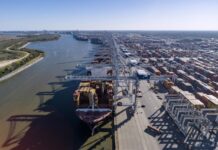
Maersk Supply Service has chosen Inmarsat Maritime’s Fleet Data Internet of Things (IoT) platform to help optimize the performance of its first vessel battery installation onboard the Maersk Minder Offshore Supply Ship, in a solution that will also allow the vessel owner to evaluate how best to optimize the use of zero-emission energy storage systems across its fleet.
An end-user API collects data from onboard equipment, organizes it with time stamps, synchronizes it, and uploads it to the customer’s visualization tools, all in a user-friendly format.
Aside from easing internal reporting and analytics, the Application Programming Interface (API) makes data available to original equipment manufacturers (OEMs) like VPS, whose data-driven decarbonisation solution, Maress, gives real-time insight into vessel performance to promote fuel savings and emissions reduction.
Importantly, Maress will assist Maersk in evaluating the battery system’s effectiveness in terms of peak shaving and energy efficiency, as well as determining the requirements for future battery installations for the rest of the fleet.
“If the maritime industry is to achieve its emissions-reduction targets, it will rely on transparency, smart use of data and collaboration – and the Maersk Minder project combines all three. By providing an open platform for data analytics, Inmarsat enables Maress to deliver actionable insights, which in turn help Maersk Supply Service to enhance vessel efficiency in the short term and decarbonise its fleet through optimised battery-enabled operations in the long term,” stated Sindre Bornstein, chief commercial officer, VPS Decarbonisation.
Furthermore, with total insight into the vessel and its hybrid battery system performance, Maersk can quickly adapt its operations to meet growing environmental standards.
One of Maersk’s clients, in particular, has already stipulated the use of battery power in some offshore activities. This highlights the competitive advantage gained by sharing real-time data with charterers on the impact of the Electric Storage System (ESS) on vessel efficiency and emissions.




